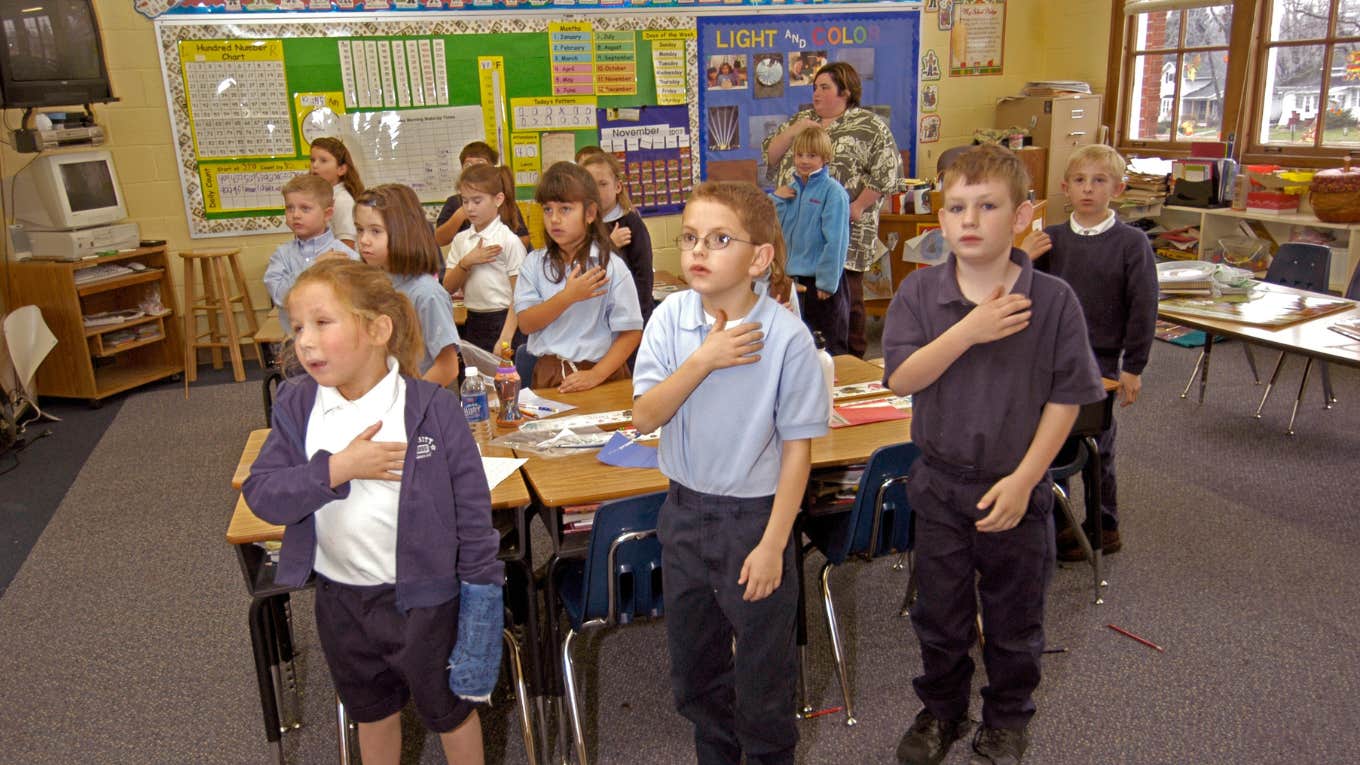Parent Requests Their Child Be Moved To A New Class Because Their Teacher Doesn’t Recite The Pledge Of Allegiance
Did you know you have rights? The Constitution says you do.
 Dennis MacDonald | Shutterstock
Dennis MacDonald | Shutterstock Did you know that the Pledge of Allegiance has been around since 1892? It has, and although the original version was slightly different from the one we recite today, it still carries the same message. For some, it is an honorable oath demonstrating loyalty to the United States; for others, it's simply a pledge.
Today, most schools have their students recite the Pledge. However, questions often arise about whether students or teachers are required to participate, and there are even laws addressing the issue. Recently, a teacher took to Reddit after he found himself caught in the crosshairs of his own classroom rules and a parent who was not pleased that those rules did not include the Pledge.
A mom complained because her child's teacher doesn't require that the students recite the Pledge of Allegiance.
"So I don't recite the Pledge of Allegiance," the teacher wrote. "I also don't require my students to do so." He explained that it is the students’ choice. If they want to participate, they can. The issue arose when one student mentioned the absence of the Pledge in the teacher's classroom, and as he wrote, "She came down to the school today to complain."
 Dennis MacDonald | Shutterstock
Dennis MacDonald | Shutterstock
The mother accused the teacher of being unpatriotic and claimed he was not putting America first. What this mother failed to realize was that her child's teacher was also a veteran. "I asked her what branch of service she served in," he stated. Her response was that she had not served, but her grandfather did.
The teacher went on to say, "Until you prove that you are willing to fight and die for this country, I am far more patriotic than you." He also cited the First Amendment, emphasizing that he was under no obligation to recite or have his students recite the Pledge.
Following the confrontation, the mother requested that her child be moved to another 6th-grade class. "This is not the first time I have received this complaint," the teacher wrote. "I just think it is wrong to make a child pledge allegiance to a government before they even know anything about that government."
A parent cannot require a teacher to participate in the Pledge of Allegiance.
This school event encompasses several different topics. There are laws, patriotism, an amendment, and history involved. To understand what happened and who is in the right, we need to look at the bigger picture. First, let's analyze the creation of the Pledge of Allegiance.
It was written in August 1892 by Baptist minister Francis Bellamy, according to UShistory.org. It originally read: "I pledge allegiance to my Flag and the Republic for which it stands, one nation, indivisible, with liberty and justice for all." Then, in 1923, the words "the Flag of the United States of America" were added. To create the version we know today, in 1954, President Eisenhower asked Congress to add the words "under God."
Another key factor of the conflict is that the teacher mentioned the First Amendment protecting them. The First Amendment gives people the right to practice their religion, freedom of speech and of the press, and the right to petition the government. In short, the teacher has the freedom of speech not to say the Pledge.
But what about the students? While they are granted freedom of speech, can schools require them to recite the Pledge? According to the Supreme Court case West Virginia State Board of Education v. Barnette (1943), they cannot. The Court ruled that students cannot be forced to salute the flag or recite the Pledge of Allegiance.
Some parents want their children to recite the pledge, and they have the right to expect that from them. What they cannot do, however, is require the teacher to share the same view. If the educator chooses not to participate, they are not obligated to, and the law also protects students from being forced to do it. The First Amendment guarantees the freedom to choose what you do or do not say.
Matt Machado is a writer studying journalism at the University of Central Florida. He covers relationships, psychology, celebrities, pop culture, and human interest topics.

